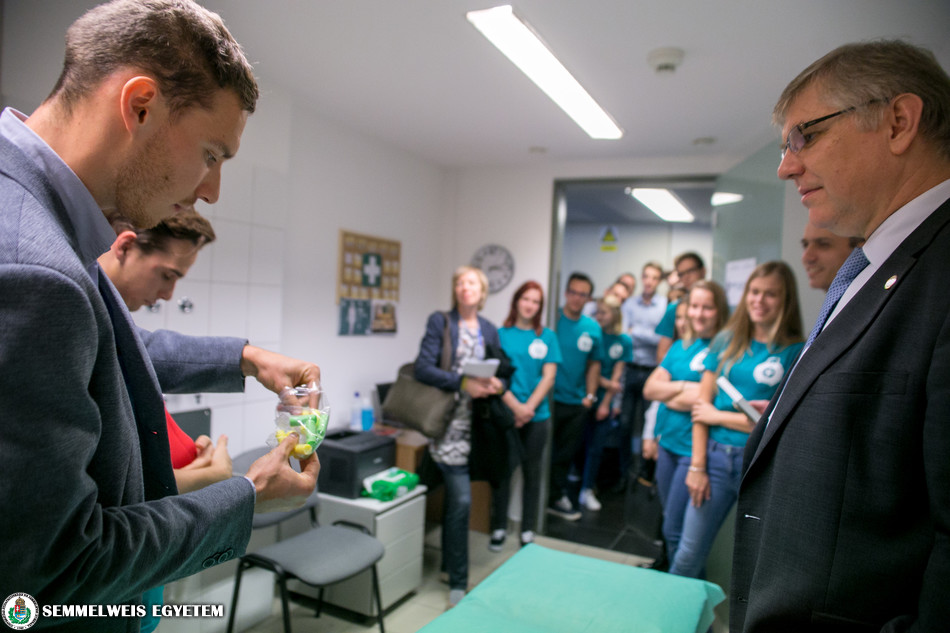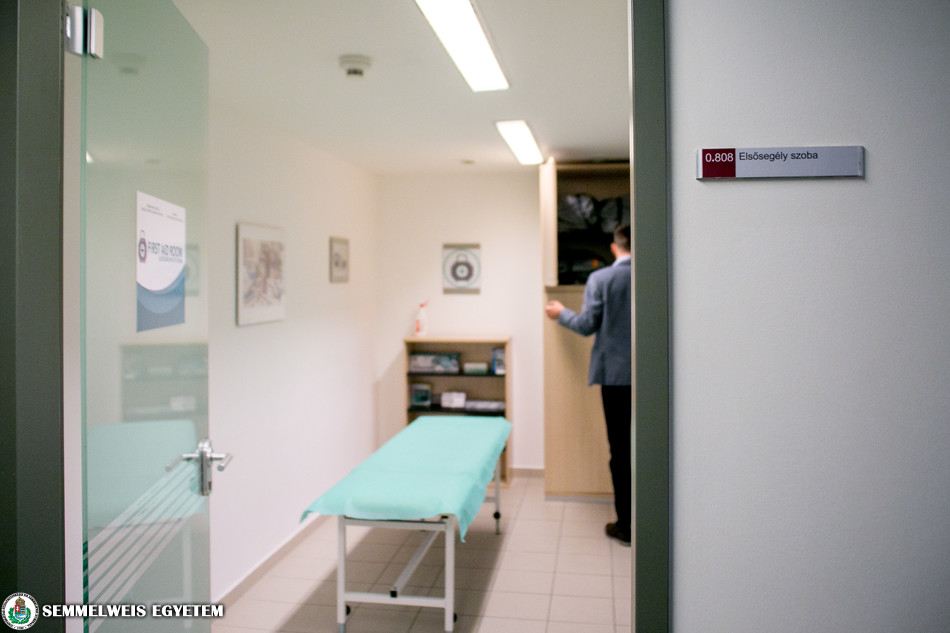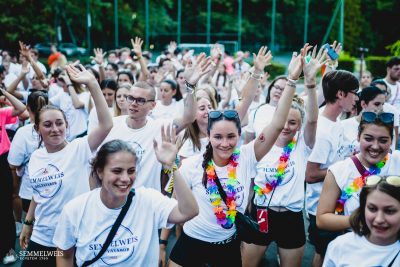A new examination room is available in the Basic Medical Science Centre (EOK) from the beginning of the Fall semester run by the Budapest Medical Students’ Association (BMSA). 34 second year students had been trained by the Department of Anaesthesiology and Intensive Therapy to handle basic emergencies and professional support is provided by the Emergency Patient Care Unit located in the Korányi building.
 The official inauguration ceremony was opened by Dr. László Hunyady, Dean of the Faculty of Medicine, who greeted the 34 volunteers participating in the programme.
The official inauguration ceremony was opened by Dr. László Hunyady, Dean of the Faculty of Medicine, who greeted the 34 volunteers participating in the programme.
“The Basic Medical Science Centre is used by a huge number of students every day and this new initiative will provide organised support in case someone is in need of medical care. During the revision of the curriculum we tried to incorporate clinical studies in the students’ first few years, thus the Introduction to Clinical Practice was introduced for second year students. The new project is in line with this approach.”, he said.
 The volunteer students will operate the service from 8 am to 8 pm during term time. Thanks to their special training they are able to treat various injuries (burns, traumas, cut wounds, penetrating wounds) as well as unconscious patients and patients with cardiac arrest. In case it is necessary, professional assistance is provided by the chief physician on call at the Korányi Emergency Patient Care Unit. Dr. Péter Kanizsai, Head of the Department said that the direct telephone number of the Department’s supervisor is available to the students, therefore they can immediately receive professional help if needed.
The volunteer students will operate the service from 8 am to 8 pm during term time. Thanks to their special training they are able to treat various injuries (burns, traumas, cut wounds, penetrating wounds) as well as unconscious patients and patients with cardiac arrest. In case it is necessary, professional assistance is provided by the chief physician on call at the Korányi Emergency Patient Care Unit. Dr. Péter Kanizsai, Head of the Department said that the direct telephone number of the Department’s supervisor is available to the students, therefore they can immediately receive professional help if needed.
The training of the volunteers was lead by Dr. Gábor Fritúz from the Department of Anaesthesiology and Intensive Therapy.
“It is very important for the student to experience medicine in practice as soon as possible. This makes them more motivated and renders the theoretical subjects more appealing as well.”, he said in his speech.
 According to József Hajnes, President of BMSA the initiative is a great opportunity for students of higher years to pass on their knowledge to the younger generation. He also expressed his thanks to Dr. Gábor Fritúz for supporting the professional activities of BMSA by handing over a certificate of honorary membership to him.
According to József Hajnes, President of BMSA the initiative is a great opportunity for students of higher years to pass on their knowledge to the younger generation. He also expressed his thanks to Dr. Gábor Fritúz for supporting the professional activities of BMSA by handing over a certificate of honorary membership to him.
The equipment of the new examination room was introduced by Péter Turai, representative of the healthcare services of BMSA.
The process leading to the establishment of the examination room was coordinated by Judit Hegedűs, Director of the Basic Medical Science Centre. The whole initiative is of voluntary nature as the Basic Medical Science Centre is not obliged to provide emergency aid.
Beside the examination room a semi-automatic defibrillator was installed and its usage was taught to the security service, the employees working at the Directorate of the Centre and the Department of Physiology.
Pálma Dobozi
Photo: Attila Kovács, Semmelweis University
Translation: Ágnes Raubinek


